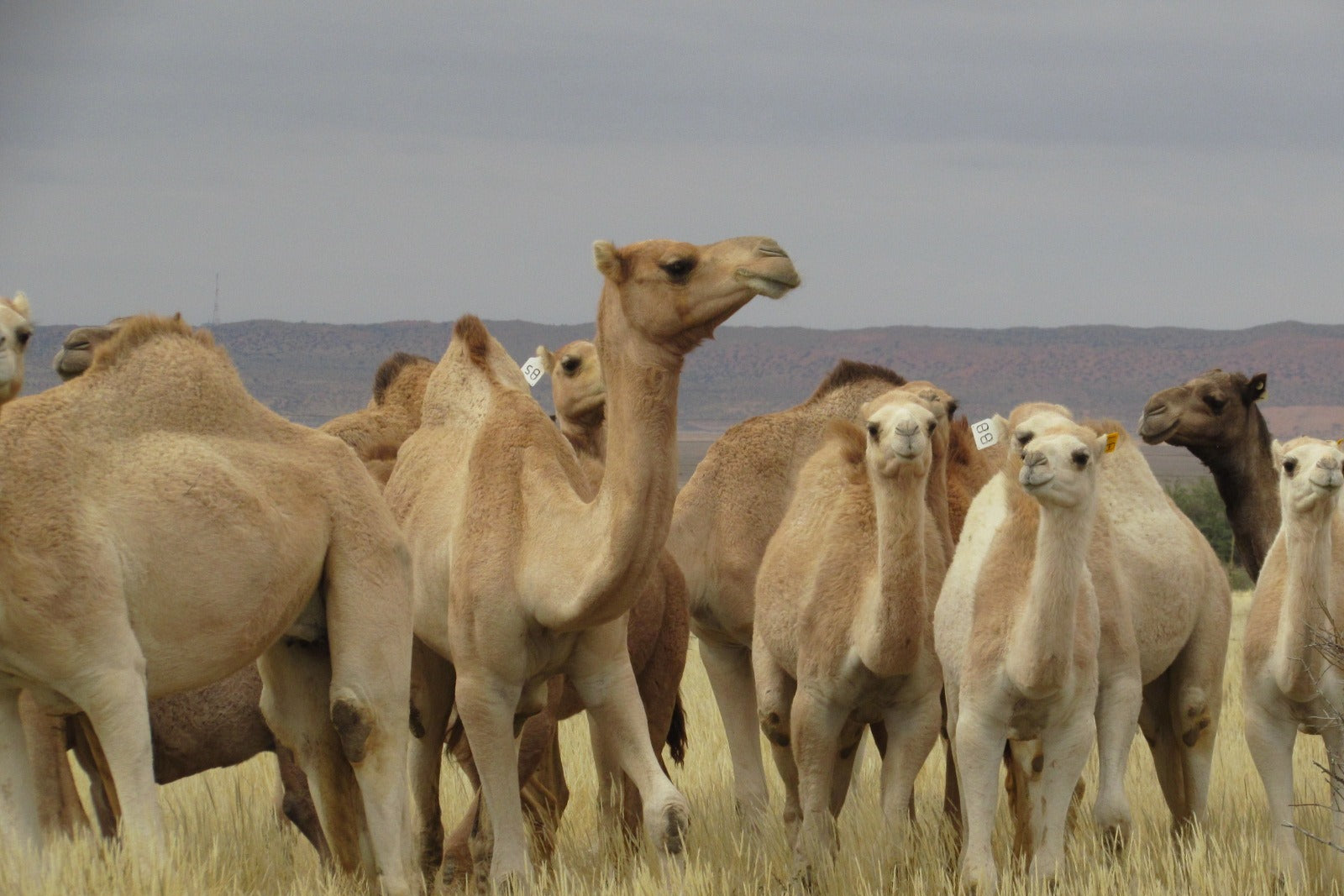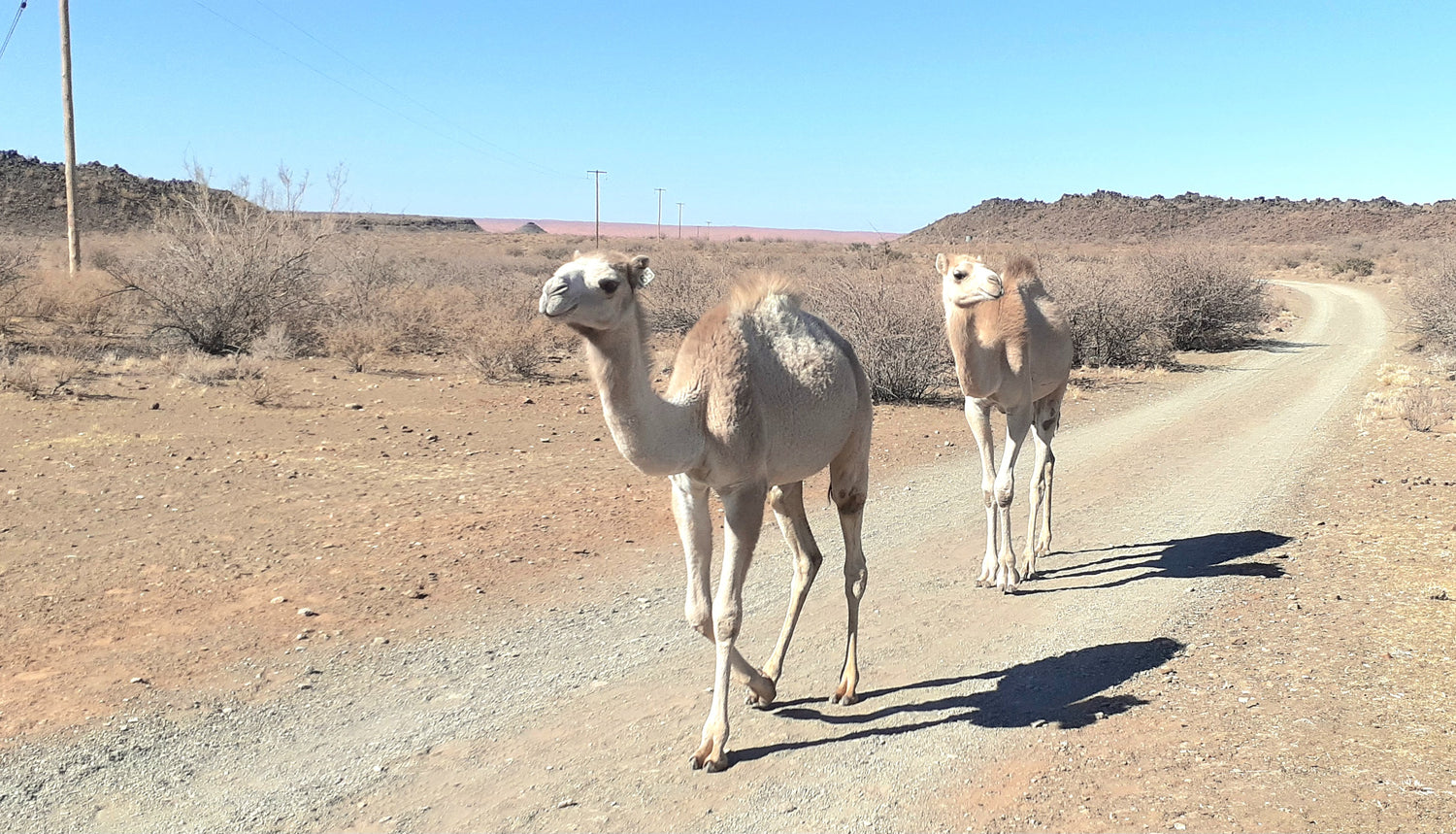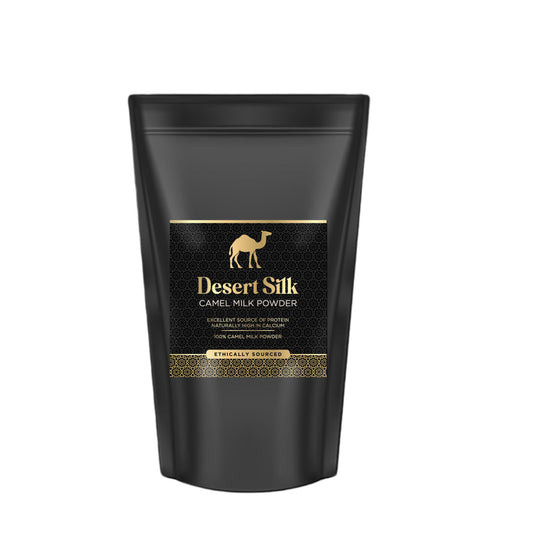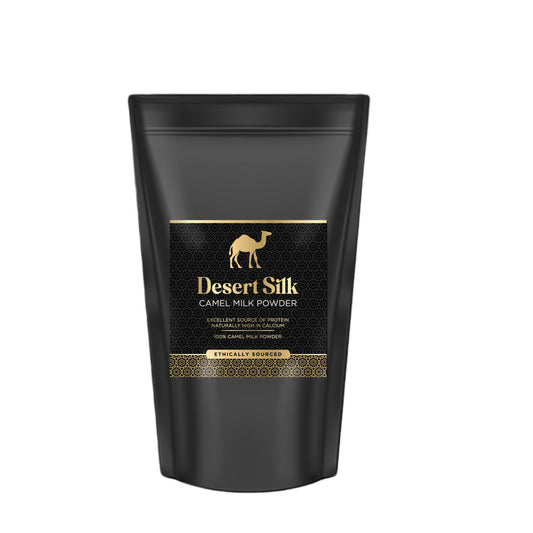

The Milk that’s Different In All the Right Ways
Unlike most dairy alternatives, camel milk tastes like cow milk.
✓ Easier on digestion
✓Free from A1 beta-casein and beta-lactoglobulin
✓ Medium-fat and nutrient-rich

High in Protein
Supports muscle repair and tissue health.

Loaded with Vitamins and Minerals
Vitamin B12, Vitamin C, calcium, iron and magnesium.

Low in Fat & Cholesterol
Heart-healthy profile that supports overall wellness.

Packed with Antioxidants
Reduces inflammation and supports immunity.
Camel Milk & Autism
Emerging research suggests camel milk may offer supportive benefits for children with autism, including:
- Improved communication and social interaction
- Calmer behaviour and greater emotional balance
- Enhanced focus and cognitive function
- Reduced gastrointestinal discomfort
Thanks to its unique composition - rich in immunoglobulins and anti-inflammatory properties -camel milk shows promising potential as a nourishing, natural dietary addition.
Collapsible content
More Info on Camel Milk & Autism
Introduction
Camel milk has recently gained attention for its potential benefits for children with autism. Research and anecdotal evidence suggest that camel milk might offer significant health and nutritional advantages for children on the autism spectrum.
Health Benefits for Children with Autism
1. Improved Digestive Health
Many children with autism experience digestive issues, including gut inflammation and imbalances in gut flora. Camel milk is known for its anti-inflammatory properties, which can help soothe the gut lining and improve overall digestive health. Its proteins and lower lactose content also make it easier to digest, reducing the risk of gastrointestinal discomfort.
2. Boosted Immune System
Camel milk contains immunoglobulins and other immune-boosting compounds that can help strengthen the immune system. Children with autism often have compromised immune systems, making them more susceptible to infections. Regular consumption of camel milk can help enhance their immune defense.
3. Behavioral and Cognitive Improvements
Some studies and parent reports report that camel milk improves behavioral and cognitive functions in children with autism. This could be due to its unique protein composition and anti-inflammatory effects, which may positively impact brain function and development. Parents have reported improvements in areas such as communication, social interactions, and focus.
4. Reduced Oxidative Stress
Oxidative stress is an imbalance between free radicals and antioxidants in the body and is often higher in children with autism. Camel milk is rich in antioxidants, which can help neutralize free radicals and reduce oxidative stress, potentially leading to improvements in behavior and overall health.
5. Better Nutritional Status
Children with autism can be picky eaters, leading to nutritional deficiencies. Camel milk’s rich nutritional profile can help fill these gaps, ensuring that children receive essential vitamins and minerals necessary for their growth and development.
Watch this video to learn even more: Is Camel Milk Good for Autism?
Conclusion
While more research is needed to fully understand the benefits of camel milk for children with autism, current findings and anecdotal evidence are promising. Its unique nutritional profile and potential health benefits make it a valuable addition to the diet of children with autism, supporting their overall health and well-being. Always consult with a healthcare professional before making significant changes to your child’s diet, especially if they have specific health concerns or conditions.
Camel Milk & Allergies
For those with dairy or environmental sensitivities, camel milk offers a gentler alternative:
- Free from the proteins responsible for most dairy allergies
- Rich in immune-supporting immunoglobulins
- Naturally anti-inflammatory, soothing symptoms rather than triggering them
- Gentle and nourishing for sensitive systems of all ages
Collapsible content
More Info on Camel Milk & Allergies
Introduction
Camel milk is a nutrient-rich dairy product that has been enjoyed for centuries in various cultures around the world. Recently, it has gained attention for its potential benefits for individuals with allergies. Thanks to its unique composition, camel milk offers several advantages that make it suitable for people with allergen sensitivities.
Health Benefits for Children with Allergies
1. Reduced Allergenic Potential
Camel milk has a different protein structure compared to cow’s milk, with proteins that are less likely to trigger allergic reactions. Casein and whey proteins in camel milk are distinct, reducing the likelihood of provoking an immune response in individuals with dairy allergies.
2. Digestive Health Improvement
For those with lactose intolerance, camel milk offers a viable alternative due to its lower lactose content. This makes it easier to digest and less likely to cause the gastrointestinal discomfort often associated with lactose intolerance.
3. Strengthening the Immune System
Camel milk is rich in immunoglobulins and other immune-boosting compounds. These natural antibodies help enhance the immune system’s response, which is beneficial for individuals with compromised immune systems or those prone to allergic reactions.
4. Anti-Inflammatory Properties
Camel milk possesses natural anti-inflammatory properties, which can help reduce inflammation in the body. This is particularly beneficial for individuals with allergies, as inflammation often accompanies allergic reactions.
5. Rich in Antioxidants
Camel milk is a good source of antioxidants, which help combat oxidative stress by neutralizing free radicals. This can be beneficial in managing allergic conditions, as oxidative stress can exacerbate allergic symptoms.
Conclusion
Camel milk offers a promising alternative for individuals with allergies and those seeking a nutrient-dense dairy option. Its unique nutritional profile and reduced allergenic potential make it a valuable addition to the diet of people with allergen sensitivities. Always consult with a healthcare professional before making significant changes to your diet, especially if you have specific health concerns or conditions.
Experience the potential benefits of camel milk and consider incorporating it into your daily routine to support your health and well-being.
Camel Milk & Diabetes
Camel milk offers promising support for those managing diabetes:
- Helps regulate blood sugar by enhancing insulin sensitivity
- Supports lower insulin resistance
- Provides daily nourishment without causing glucose spikes
- Backed by emerging research and trusted by those seeking natural wellness solutions
Collapsible content
More Info on Camel Milk & Diabetes
Introduction
Camel milk has been an important part of various cultures for centuries, valued for its unique taste and nutritional properties. Recent research indicates that camel milk can offer numerous benefits for people with diabetes. Due to its unique composition and health benefits, camel milk could be a valuable addition to the diet of diabetics.
Health Benefits for Children with Diabetes
1. Improved Blood Sugar Control
Research shows that camel milk can help regulate blood sugar levels. This is due to the presence of insulin-like proteins in camel milk that help improve insulin sensitivity and glucose uptake by cells. Regular consumption can contribute to more stable blood sugar levels.
2. Strengthening the Immune System
Diabetics often have weakened immune systems, making them more susceptible to infections. Camel milk contains immunoglobulins and other immune-boosting compounds that can help strengthen the immune system and improve overall health.
3. Anti-Inflammatory Properties
Camel milk has natural anti-inflammatory properties that can help reduce inflammation in the body. This is particularly beneficial for diabetics, as chronic inflammation plays a role in the development of diabetes complications.
4. Rich in Antioxidants
Camel milk is rich in antioxidants that help neutralize free radicals and reduce oxidative stress. This can help protect cells and tissues from damage, which is crucial for preventing diabetes-related complications.
5. Improved Lipid Profile
Regular consumption of camel milk can help improve the lipid profile by lowering LDL cholesterol (bad cholesterol) and increasing HDL cholesterol (good cholesterol). This contributes to better cardiovascular health, which is especially important for diabetics who are at increased risk of heart disease.
Conclusion
While more research is needed to fully understand the benefits of camel milk for diabetics, current findings and anecdotal evidence are promising. Its unique nutritional composition and potential health benefits make camel milk a valuable addition to the diet of people with diabetes. Always consult a healthcare provider before making significant changes to your diet, especially if you have specific health concerns or conditions.

Straight from the Kalahari, Naturally Nutritious
Our free-roaming camels graze on a large variety of indigenous plant species on our Kalahari farm, producing milk that’s naturally richer in diverse nutrients.
- Free-roaming camels
- Wild, indigenous plant-based diet
- No antibiotics or hormones, ever
Shop Camel Milk
-
Buy Camel Milk Powder 1kg – Pure & Organic from South Africa
Regular price R 1,200.00 ZARRegular priceUnit price / per -
Desert Silk Camel Milk Powder 300g – Smooth, Digestion Friendly
Regular price R 380.00 ZARRegular priceUnit price / per -
50% Cocoa Camel Milk Chocolate – Desert Silk - Made in South Africa
Regular price R 118.00 ZARRegular priceUnit price / per



